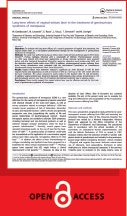Authors: M. Gambacciani, M. Levancini, E. Russo, L. Vacca, T. Simoncini and M. Cervigni
Published in Climacteric. 2018;21(2):148-152
1. TWO-YEAR FOLLOW UP OF PATIENTS
First longitudinal study on the use of minimally invasive Er:YAG technology for the treatment of genitourinary syndrome of menopause (GSM), showing long-term efficacy of RenovaLase®.
2. LARGE GROUP OF TREATED PATIENTS
205 postmenopausal women received three laser sessions of RenovaLase® at 30-day intervals. Study assessment was performed throughout the 24-month follow-up period and included the subjective visual analogue scale (VAS) and the objective vaginal health index score (VHIS). Furthermore, postmenopausal women suffering from stress urinary incontinence symptoms were evaluated with the International Consultation on Incontinence Questionnaire-Urinary Incontinence Short Form (ICIQ-UI SF).
3. BETTER RESULTS COMPARED TO LOCAL TREATMENT
Non-ablative Er:YAG laser treatment induced a statistically significant (p <0.01) decrease in VAS for vaginal dryness and dyspareunia, and VHIS was significantly increased (p <0.01) up to the 12th month after the final laser treatment. Values reported after 18 and 24 months returned to the baseline level. Furthermore, 144 women suffering from mild to moderate SUI also showed improvement in urine leakage. No major adverse events were reported.
4. STRONG PROOF OF EFFICACY AND SAFETY OF THE RENOVALASE® TREATMENT
The efficacy of non-ablative Er:YAG laser treatment has been demonstrated by several clinical studies, but data on long-term effects was lacking to fully support it. This longitudinal study therefore fills an important gap in the story of non-invasive treatments for GSM.




